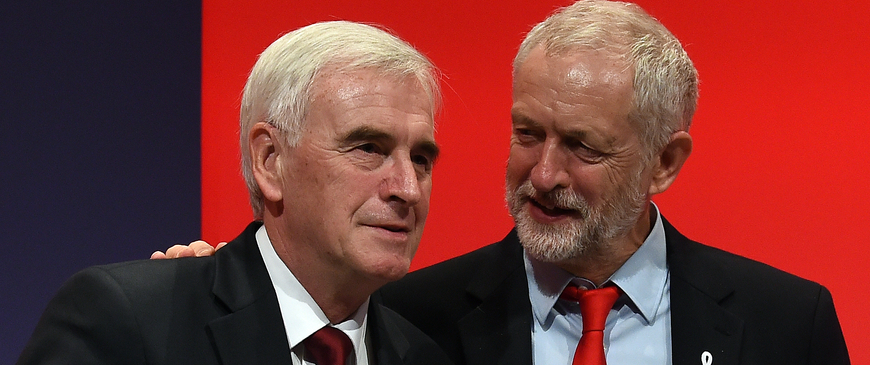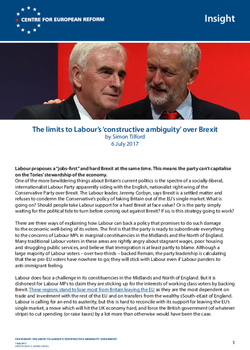
The limits to Labour's 'constructive ambiguity' over Brexit
Labour proposes a "jobs-first" and hard Brexit at the same time. This means the party can't capitalise on the Tories' stewardship of the economy.
One of the more bewildering things about Britain’s current politics is the spectre of a socially-liberal, internationalist Labour Party apparently siding with the English, nationalist right-wing of the Conservative Party over Brexit. The Labour leader, Jeremy Corbyn, says Brexit is a settled matter and refuses to condemn the Conservative’s policy of taking Britain out of the EU’s single market. What is going on? Should people take Labour support for a hard Brexit at face value? Or is the party simply waiting for the political tide to turn before coming out against Brexit? If so, is this strategy going to work?
There are three ways of explaining how Labour can back a policy that promises to do such damage to the economic well-being of its voters. The first is that the party is ready to subordinate everything to the concerns of Labour MPs in marginal constituencies in the Midlands and the North of England. Many traditional Labour voters in these areas are rightly angry about stagnant wages, poor housing and struggling public services, and believe that immigration is at least partly to blame. Although a large majority of Labour voters – over two-thirds – backed Remain, the party leadership is calculating that these pro-EU voters have nowhere to go; they will stick with Labour even if Labour panders to anti-immigrant feeling.
#Labour MPs are dishonest to claim they are sticking up for the working class voters by backing #Brexit.
Labour does face a challenge in its constituencies in the Midlands and North of England. But it is dishonest for Labour MPs to claim they are sticking up for the interests of working class voters by backing Brexit. These regions stand to lose most from Britain leaving the EU as they are the most dependent on trade and investment with the rest of the EU and on transfers from the wealthy South-East of England. Labour is calling for an end to austerity, but this is hard to reconcile with its support for leaving the EU’s single market, a move which will hit the UK economy hard, and force the British government (of whatever stripe) to cut spending (or raise taxes) by a lot more than otherwise would have been the case.
The second explanation for Labour’s support for Brexit is that it is just strategic ‘triangulation’. With the government backing a hard Brexit, all that the Labour Party needs to do in order to retain the support of working class voters opposed to freedom of movement and pro-EU voters is to signal that it favours a softer Brexit than the Conservatives. According to this line of reasoning, Labour has little to gain electorally at this point from coming out against exiting the single market; it will only make sense to do so once Conservative Party unity on the issue has crumbled and popular opinion has turned against Brexit.
Net immigration to the UK from the rest of the EU is already falling and this trend is highly likely to gather momentum over the next 6-12 months as the UK economy struggles and the eurozone recovery gains strength, undermining the attractiveness of the UK as a place to live and work. Could this open up some political space for Labour to moderate its opposition to free movement and with it single market membership? It might, but hostility to immigration is not really about the numbers. A fall in the number of people coming to live in the UK will not lead to a sudden fall in hostility to immigration in Wolverhampton or Sunderland, where in any case there are relatively few workers from other EU countries.
Will Britain’s worsening economic situation & international isolation enable #Labour to do a U-turn?
Will Britain’s worsening economic situation and growing international isolation turn public opinion against Brexit, and enable Labour to do a U-turn? It is possible that Labour can simply stand back and wait for the Conservatives to split, and for the public to wake up to the benefits of staying in the single market. But it is a risky strategy. The problem is that because it has joined the government in backing exit from the single market, Labour is unable to hold the Conservatives to account for the damage Brexit is doing to the economy. Labour will no doubt attempt to exploit resentment at falling wages, but voters need to make the connection between the bad economic news and Brexit if they are to turn against it. And this will not happen while Labour is engaged in a conspiracy with the Conservatives to keep voters in the dark about what they have voted for.
The third possible explanation for Labour’s failure to oppose Brexit is ideology. For most of the last 30 years the Labour Party was strongly pro-EU, even if its failure (with the notable exception of Tony Blair) to defend the EU publicly against Britain’s eurosceptics is one reason why the country is now in such an invidious position. But the Labour Party has always included a hard left that sees the EU as a Trojan horse for neo-liberalism. And the party is now led by this wing: the parliamentary voting records of Jeremy Corbyn and the party’s shadow finance minister, John McDonnell, point to committed euroscepticism. Neither objects to the free movement of labour – both see themselves as internationalists – but they oppose the free movement of goods, services, and especially capital.
What the Labour left resents is what they see as a constraint on their freedom to intervene in the economy. The EU certainly prevents member-states from privileging their firms at the expense of those from other member-states. But the EU includes plenty of countries that pursue successful industrial policies of the kind Labour claims to want to see in Britain. The Labour left is falling into the same trap as the Tories: blaming the EU for Britain’s own domestic policy failures. Moreover, any trade deal with the EU will require Britain to abide by EU competition and state aid rules. Is the Labour leadership saying it wants no deal at all, and for Britain to trade with the EU under WTO rules?
The Labour Party cannot assume that Remain voters will continue to give it the benefit of the doubt over Brexit. Constructive ambiguity over the issue may have worked at June’s general election, but Labour will have to take a stand on Brexit – and lay the basis for a parliamentary coalition against leaving the single market – if it is to avoid ending up as split over the issue as the Conservatives. Labour needs voters to make the connection between the coming economic downturn and Brexit. That way it can offer a realistic alternative policy, leading back to growth via single market membership. This requires it to be open about the costs of leaving the single market and to demonstrate to voters that their concerns about freedom of movement can be addressed without Britain leaving the single market.
#Labour needs voters to make the connection between the coming economic downturn & #Brexit.
To this end, Labour needs to be far more radical about addressing the underlying reasons for hostility to free movement of labour: shortage of housing, strained public services, labour market insecurity and general pessimism about the future across much of provincial Britain. At present the only really radical thing in Labour’s manifesto is its support for leaving the EU. The party could commit to a massive house-building programme by allowing local councils and housing associations to borrow, and by taking aggressive steps to combat land hoarding by private developers. Announcing a big programme of investment in the moribund infrastructure of the Midlands and North would do much to reassure people in these regions that they had not been forgotten, as would – more radically – committing to move the country’s capital from London to Manchester.
Less progressive perhaps, but certainly politically salient, would be a drive to tighten up Britain’s labour market regulation and enforce EU regulations more rigorously. Britain could raise the level of training or qualifications workers need to be allowed to do certain jobs, such as in construction, and beef up enforcement of the country’s minimum wage. It could use existing flexibility with EU law to crack down on EU migrants who do not have jobs and cannot support themselves. The UK authorities could also vigilantly enforce EU rules such as the agency workers’ directives and join French calls for reform of the posted workers’ directive (which allows foreign workers to avoid tax and social security contributions for limited periods of time). Some combination of the measures outlined here could help to address the perceived unfairness of freedom of movement without inflicting huge damage on the economy. And by taking some of the steps at its disposal, Britain might well gain a more sympathetic hearing from the EU for its call for an emergency brake on immigration.
Labour’s current policy of constructive ambiguity on Brexit is not the win-win approach its advocates claim. The party leadership needs to make the case for single market membership and demonstrate what can be done to address the concerns about freedom of movement while remaining within the single market. If it does not, it will struggle to show that it has a better solution to the economic downturn caused by Brexit than the Tories have, and risks ending up as divided as its opponents.
Simon Tilford is deputy director of the Centre for European Reform.


Comments
The UK pushed the EU much too far to the neoliberal right, and unless that changes, as it might, Labour have to hope to leave the single market.
People with concerns about immigration are not going to be persuaded by minor tweaks, like kicking out people who 'cannot support themselves' (a policy if adopted by the Home Office would invariably end up booting out many people unfairly, like sick people/self employed/partners etc).
The EU is not going to entertain an immigration break when it is quite clear that the UK has every ability to deal with current immigration levels, but is failing to implement the proper measures as a result of poor governing.
Rather, if they are to have any dignity socialist Labour should do the proper thing and stand up for workers without making apologies or appeasing to the anti-immigration mood. Staunch supporters of anti-immigration policies aren't going to be satisfied at any point, they will simply ask for more.
There is perhaps a 4th option. The Labour Party is biding their time until a post-Brexit period when the impact is strongly felt and the tide against the current Government has truly turned. No matter which option, the article really exposes the lack of leadership from both UK main parties and a fundamental failure to seek to protect UK citizens from the inevitable damage which will follow as the UK exits the EU.
Add new comment